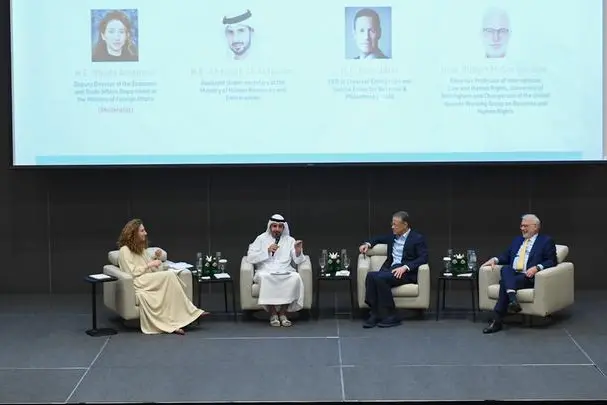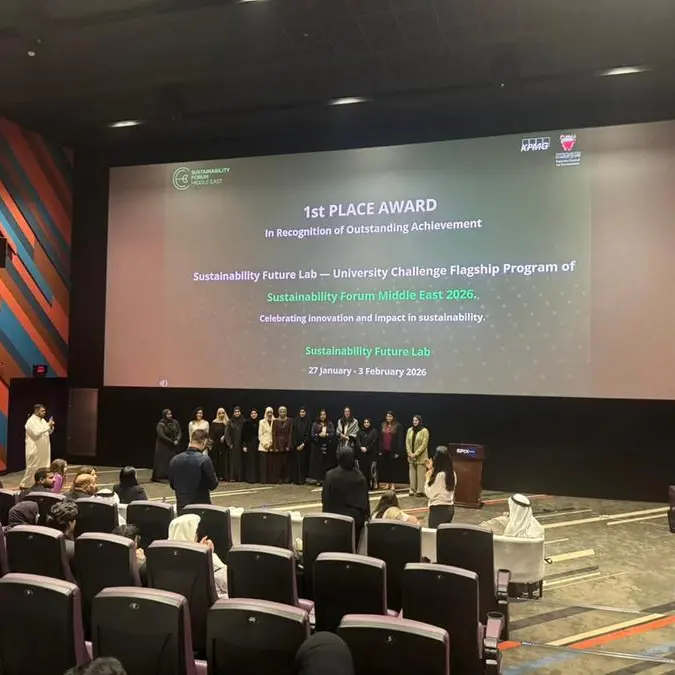PHOTO
Abu Dhabi – Yesterday, leading figures from government, civil society and academia came together to explore the intersection between business and human rights at an insightful fireside chat hosted by the UAE Permanent Committee for Human Rights (PCHR), in collaboration with the Anwar Gargash Diplomatic Academy (AGDA) and with conceptual input from the British Institute of International and Comparative Law (BIICL). The event was held with the participation of the Ministry of Human Resources and Emiratisation (MOHRE).
The fireside chat considered the important role the business community plays in advancing human rights and Sustainable Development Goals – as frameworks that are inextricably linked and are reinforced by one another. Examining the international mechanisms that promote responsible business conduct, the event provided a first-hand opportunity to discuss the UN Guiding Principles on Business and Human Rights (UNGPs) and their application in various local and international contexts.
Hind Alowais, Director of the PCHR, opened the event by highlighting the impact businesses have on the lives of millions of people around the world – from offering access to social and economic opportunities, to playing a crucial role in safeguarding the most vulnerable in our societies. Against this backdrop, she highlighted the responsibility of corporates to promote human rights, and the role governments can play in supporting businesses on this journey.
Moderated by Ghada Alnabulsi, Deputy Director of the Economic and Trade Affairs Department at the Ministry of Foreign Affairs, the fireside chat heard insights from distinguished speakers, which included: HE Abdulla Ali Rashed Al Nuaimi, Assistant Undersecretary for Domestic Work Affairs at the Ministry of Human Resources and Emiratisation; Professor Robert McCorquodale, Emeritus Professor of International Law and Human Rights at the University of Nottingham and Chairperson of the United Nations Working Group on Business and Human Rights, who spoke in his personal capacity; and HE Badr Jafar, CEO of Crescent Enterprises and Special Envoy for Business and Philanthropy, UAE.
The conversation explored how the UNGPs outline a set of principles for responsible conduct, provide guidance for implementing ethical practices throughout global supply chains and act as a roadmap for businesses to contribute to Sustainable Development Goals. Notwithstanding this, the speakers reflected on how the application of UNGPs will depend on local and specific contexts, with the activities businesses undertake to promote human rights differing around the world.
HE Abdulla Ali Rashed Al Nuaimi, Assistant Undersecretary for Domestic Work Affairs at the Ministry of Human Resources and Emiratisation, stressed the significance of the session, which provided an ideal platform to communicate, explore best practices and share the success, progress and achievements that have been made in the UAE in the field of business and human rights.
HE Al Nuaimi reflected on the UAE’s journey during the fireside chat, noting: “The Ministry of Human Resources and Emiratisation is taking part in these sessions at a time when it is setting a series of notable milestones and amidst key strategic developments transforming the UAE labour market. A set of new legislations has been introduced that significantly enhance ease of doing business, adding to the social protection ecosystem we have launched to benefit workers across the country, which includes the Unemployment Insurance Scheme, Savings Scheme, and Workers’ Protection Programme, among many other initiatives – all designed to streamline operations, enforce workers’ rights and ensure their wellbeing, while also protecting employers’ rights at the same time.”
Ghada Alnabulsi, Deputy Director of the Economic and Trade Affairs Department at the Ministry of Foreign Affairs, added: “The UAE prides itself in the progress it has made in imbedding ethical practices in its business community. Yesterday’s discussion allowed us to better understand how important it is to ensure a fortified regulatory system that not only aligns with the UN Guiding Principles on Business and Human Rights, but also protects the interests of all stakeholders.”
Professor Robert McCorquodale, Emeritus Professor of International Law and Human Rights, University of Nottingham and Chairperson of the United Nations Working Group on Business and Human Rights, said: “Businesses have a responsibility to respect human rights and governments have an obligation to protect against human rights abuses by businesses within their jurisdiction – whether those businesses have caused, contributed to or are directly linked to that abuse. Businesses should undertake human rights due diligence, which places people and the planet at the centre, in order to identify, prevent and mitigate actual and potential adverse human rights impacts of their activities, and then remediate when necessary.”
HE Badr Jafar, CEO of Crescent Enterprises and Special Envoy for Business and Philanthropy, UAE, said: “Businesses globally are increasingly looking to redefine their social contract with society, accepting their wider corporate citizenship responsibilities. Given the interconnected nature of supply chains, the private sector significantly influences both the environments they operate in and the communities they engage with. By implementing responsible business practices that uphold human rights, the business community at large can effect transformative positive change across sectors and borders”.
Yesterday’s fireside chat forms part of an ongoing event series hosted by the UAE Permanent Committee for Human Rights and the Anwar Gargash Diplomatic Academy, which provides a platform to exchange best practices in the implementation of human rights, while building on the UAE’s established tradition of working with international and regional partners to promote and protect universal human rights in accordance with international obligations.
-Ends-
About the UAE Permanent Committee for Human Rights
The Permanent Committee for Human Rights acts as the national liaison and coordinator between relevant human rights related bodies within the UAE to promote and protect human rights in the country. It also works closely with international human rights organisations and partner countries to support progress and prosperity of the global community.
The Permanent Committee for Human Rights (formerly named the National Human Rights Committee) was established by the Council of Ministers in October 2019. Its members include several UAE ministries and institutions.




















